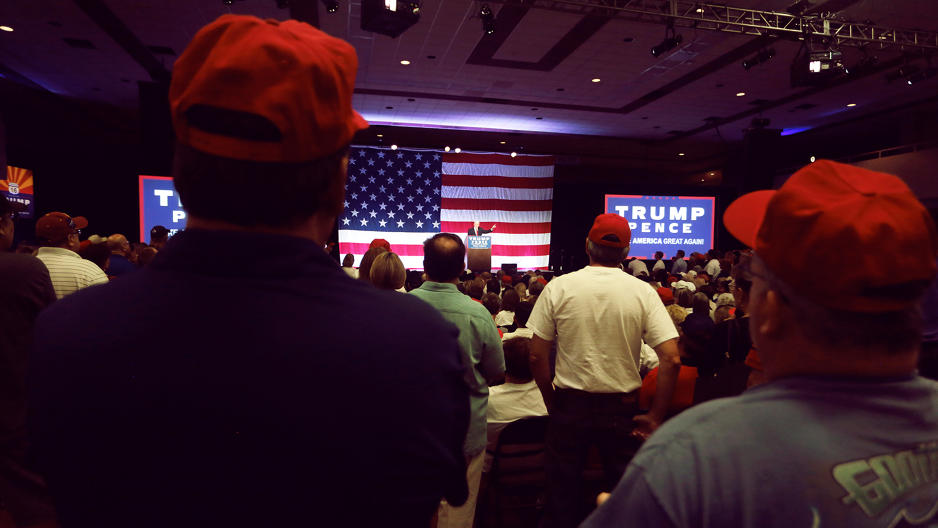Escape Your Echo Chamber And Understand What Really Makes Trump Supporters Tick
As the holidays draw near, many people aren’t feeling as warm and fuzzy as usual. This year’s bitter—and, at times, gobsmacking—election has left the country feeling more divided than ever. A recent CNN/ORC poll found that 85% of Americans believe that their country is more split on major issues now than in years past. In practice, there’s a lot of tension in everyday relationships. Many are experiencing powerful feelings of anger and resentment as they interact with neighbors, coworkers, and relatives who voted differently than they did.
In liberal hubs around the country—New York, San Francisco, Chicago—Hillary Clinton supporters are going through various stages of grief in the wake of their unexpected defeat. And even as emotions gradually become less volatile, people from opposite ends of the political divide feel like they fundamentally can’t understand one another. Those on both sides are asking, What could possibly provoke someone to vote for someone so untrustworthy, unqualified, and wrongheaded?
How do we begin to rebuild bridges?
Spencer Greenberg, CEO of Clearer Thinking, a nonpartisan organization that conducts research on decision making, makes the case that it is vital for us to try to understand—and better yet, empathize—with the other half of the country. “The election made it clear that people of all political persuasions are suffering and looking to their candidate to help alleviate their pain,” Greenberg says. “There are altruistic reasons to care about people on the other side. But if you want to be more pragmatic, it is also true that understanding their angst can help your side better prepare for the next election.”
Since Clearer Thinking is based in New York, where the majority of people are Democrats, Greenberg and his team were specifically focused on trying to learn what makes Trump supporters tick. After all, Greenberg points out, 62 million people voted for Trump.
Social media gives us a warped view of reality, since it makes it easy for us to filter out people who don’t share our point of view. But in everyday life, you don’t have to go very far to find a smart, thoughtful person who voted for the other candidate. Take Andy Leffler, for instance, an accountant in his late thirties who works at an apparel manufacturing company in New York City. He’s a rare Trump supporter in a sea of Democrats, and at times during the election, he felt he had to hide his beliefs. “In an environment like this, it was very hard to be openly ‘the other side,'” he says. “Everyone was so disparaging, and they would start putting labels on you.”
Although Leffler has an advanced degree, is gainfully employed, and enjoys living in the multicultural atmosphere of New York City, he has seen his hometown of Shamokin in central Pennsylvania fall into hard times over the last two decades. “It’s an old coal-mining town that feels a lot like Scranton,” he explains. “All the factories have left; poverty rates have gone up and drug use has been prevalent.” He’s a Republican and was drawn to Trump’s slogan—”Make America Great Again”—because it tapped into his nagging feeling that his country is on a downward spiral. That’s certainly what he sees every time he heads to his hometown. “It brings you back to a different time in America, to what you might call the golden age in the 40s, right after we won a big war, our factories was booming, and everybody seemed to have money,” Leffler says. “People who were peasants became middle class, and they were getting the American Dream.”
Greenberg was keen to get into the mind of a person like Leffler. Even though they live in the same city and are exposed to much of the same culture, their political choices make them seem like they’re worlds apart. Over the last few months before the election, he and his team at Clearer Thinking laid out a strategy to gather data about the differences between Trump and Clinton supporters. The organization’s first step was to go beyond the simple polls and basic demographic data, and do more in-depth qualitative research about the beliefs of Trump supporters.
They did six separate studies in which they surveyed 800 people who identified themselves as either Trump or Clinton supporters. They collected data on 138 variables on each person, from their demographics to their beliefs to their personalities. Whenever there was something they believed required further clarification, they asked follow-up questions to learn about their reasoning. It appears to be the most comprehensive study of its kind.
One caveat: The participants were recruited online, so they were not entirely representative of the country, because they skewed toward people were were more technologically adept. However, the researchers ensured that these participants’ characteristics were consistent with as many nationally representative demographics as possible. The Trump supporters they surveyed tended to be more white, male, and rural, for instance, which is consistent with other data on Trump supporters.
Their findings were surprising.
It’s Incredibly Difficult To Measure Racism
Many polls have identified Trump supporters as more racist and nationalist than Clinton supporters. But what these polls don’t explain is that defining and measuring racism is extremely difficult.
Racism can be defined in many ways, ranging from simply believing that race is a valid social classification to actively denigrating groups of people because of their racial or ethnic makeup. It gets even murkier when you add the issue of immigration. There are some people who are worried about losing jobs to immigrants; some perceive this to be a form of racism, while others see it simply as economic anxiety.
Social scientists have at least four ways to study racism, all of which have well-known flaws, and different methods often result in very different outcomes. “In the mainstream media, pollsters tend to use one simple method of measuring racism, then draw grandiose conclusions based on it,” Greenberg says.
Some polls, for instance, ask questions that correlate with racism, such as whether immigrants threaten American customs and values. Researchers generally determine that people who agree with this statement are more racist than those who do not. When Clearer Thinking asked this question, they found that 41% of Trump supporters strongly agreed with the statement, while only 7% of Clinton supporters did. But they wanted to better understand these responses, so they asked a follow-up question, asking participants to explain why they answered the way they did. Their findings were unexpected.
Some people were clearly racist, saying things like, “Muslims . . . hate us and come here to take our welfare dollars. As their numbers grow and we don’t speak out against it, there will no longer be a tolerant, loving USA.” But there were other people whose follow-up answers did not appear to be racist at all. They said things like, “Immigrants may emphasize their own culture over American culture, but this is not necessarily a bad thing.” In this case, the person answering appeared to simply be acknowledging the fact that immigrants would change American culture, not making a value judgment about it. When Clearer Thinking went through the follow-up responses and coded them by how racist they actually were, they found that while on the whole Trump supporters tended to be slightly more racist than Clinton supporters, they were only marginally so.
Greenberg believes that these overall results should be heartening. The websites that claim Trump supporters voted for him because they are racist don’t have the data to back this up. It would be fair to assume, then, that the average Trump supporter you meet is not racist. And many Trump supporters feel angry and defensive about being accused of being racist, when they aren’t. Leffler is among them. “Racism is more systematic across society than within individuals,” he says. “The solution isn’t to train individuals, but to train society as a whole to be more tolerant.”
Trump And Clinton Supporters Speak Different Languages
Among Clearer Thinking’s 138 variables, the biggest predictor of whether someone would vote for Trump was their official party affiliation. But the second biggest predictor of support for Trump was whether they believe there is too much political correctness in this country. This is something that came up repeatedly during the election. One Washington Post writer pointed out, “If there is one uniting principle the defines Donald Trump’s campaign for president—besides, perhaps, winning and being classy—it is that political correctness is bad.”
But what exactly does this mean? Clearer Thinking’s analysis found that Trump and Clinton supporters have very different relationships to language itself. Clinton supporters said they believe in political correctness because it stops people from hurting other people and is merely another way to ensure that our discourse has a common decency. Trump supporters, on the other hand, believe that political correctness makes people afraid of speaking their minds and prevents properly addressing important problems in society, including government corruption and crime in black communities. “I think most people would admit that it is possible for reasonable people to disagree on this issue,” Greenberg says.
Leffler’s views on this were pretty consistent with those of other Trump supporters. He explains that when he came to New York, he had to learn how to speak in the vernacular of the liberal New York City environment. “That’s how I can talk to you right now without saying 30 wrong things,” he says. “Before, I would use the wrong expressions and the wrong terminology for people. It was very un-PC, but all my sentiments were the same.”
Different approaches to language may explain why Trump and Clinton supporters had such opposite responses to their candidate’s rhetoric. The two groups appear to have fundamentally different understandings of what it means to speak honestly. While Clinton supporters tend to take a very literal view of honesty, that is, getting your facts and numbers correct, Trump supporters believe that honesty has more to do with saying what is actually on your mind rather than filtering it for your audience. Clinton supporters generally value truth and accuracy, while Trump supporters care about authenticity.
This is why Trump and Clinton supporters reacted so differently to Trump’s flexible relationship with the truth. “When Trump said that 90 million Americans were unemployed, Clinton supporters said he was lying,” Greenberg points out. “But Trump supporters were more concerned about the sentiment underneath, which is that far too many Americans are unemployed. They saw it as Trump honestly expressing his feelings in an unscripted away.”
Leffler also points out that there are many ways of using language to harm people. “There are different types of bullying,” he explains. “Trump’s was a playground-type bully, but on the other side, there’s the condescending type of bullying, where you talk over or down to people, where their view doesn’t matter because they are too stupid or unintelligent to understand your high view of society.”
The U.S. Might Be On The Verge of Economic Collapse . . . Or Not
This seems like an easy one. After all, there are statistics we can track to determine the country’s economic health. And yet Trump supporters tend to report that the U.S. is doing much worse economically than Clinton supporters do.
But it turns out that this is a far more complicated question than meets the eye. The U.S. stock market has been doing well over the last few years and unemployment figures have fallen substantially in recent years, suggesting that the country is prospering. But the economic recovery since the Great Recession has been uneven across the country, and real wages have been stagnant for a long time.
Greenberg says that both sides can point to valid evidence to support their point of view that the U.S. is doing well or poorly. “People tend to be judging the economy subjectively, based on what they are seeing around them, in their community, and among their friends and family,” he says.
For Clinton supporters who tend to live in regions that are economically prosperous, it can be hard to understand why Trump supporters respond so strongly to Trump’s claims that the U.S. is in decline. But for someone like Leffler, whose hometown has been slipping into poverty for some time now, Trump’s words resonate. “When I heard ‘Make America Great Again,’ it meant something to me,” he says. “It took me back to a time before heroin had overtaken my town, before all the factories left. It made me feel like there was hope to bring it back to another golden age.”
In the days after the election, there was a great deal of anxiety about how the country would change with Trump as president. Would his supporters feel empowered to commit acts of racist violence? Would all social niceties be swept away as political correctness becomes a relic of the past?
Clearer Thinking’s research suggests that many of these fears were unfounded. While there are certainly some Trump supporters who have expressed radical views—particularly the vocal ones in the white nationalist movement—it would seem that the vast majority are not really that different from Clinton supporters. They just have very different ideas about how to solve the country’s problems.
“We spent hours and hours reading people’s responses to these different questions,” Greenberg says. “I began to feel that not only could I understand what they were saying, but I could somewhat relate to what they were saying. And this can only be a good thing, because it means you can actually begin to have a conversation with people who think differently from you.”
For those on the other side seeking to take the country in a different direction in the next election, having a deep, accurate understanding of what makes Trump supporters tick is the first step to winning them over.
Editor’s Note: The article has been modified from a previous version to clarify Greenberg’s statement.
Fast Company , Read Full Story
(59)














